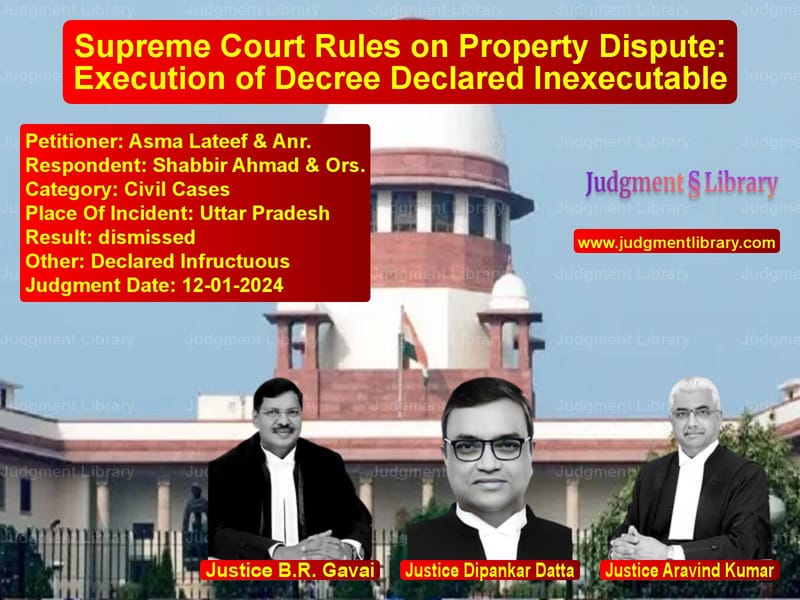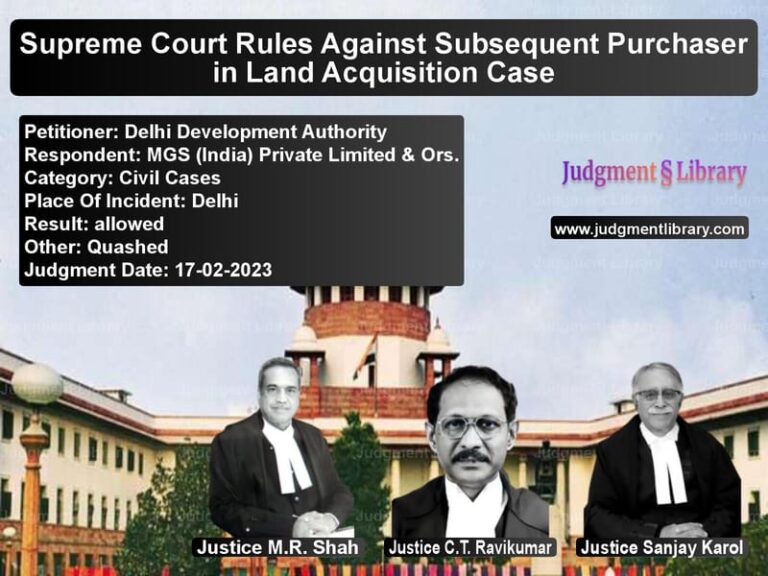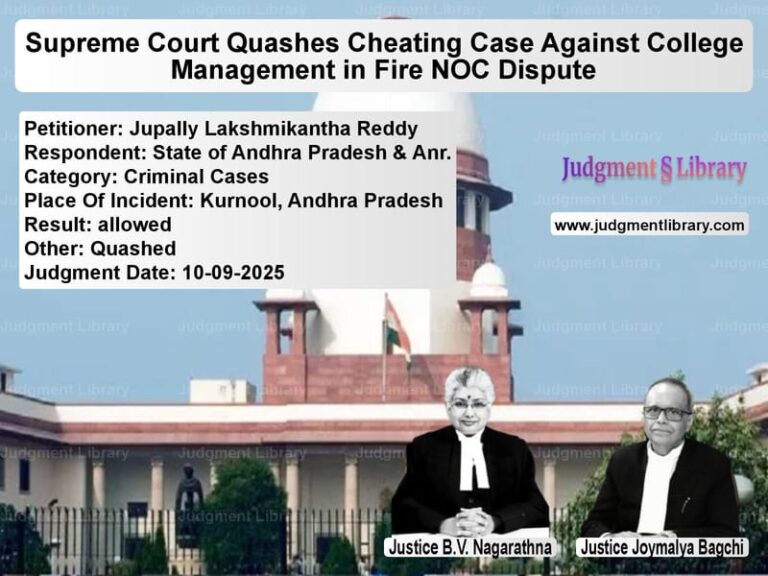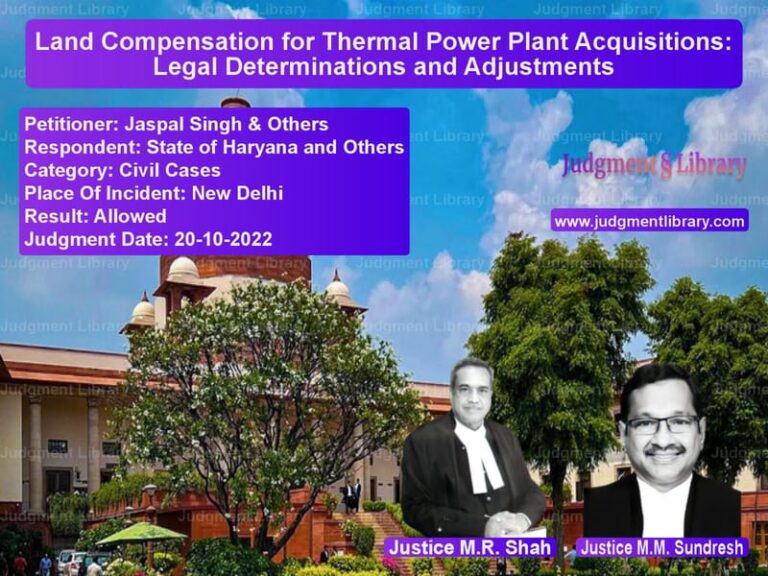Supreme Court Rules on Property Dispute: Execution of Decree Declared Inexecutable
The Supreme Court of India recently delivered a landmark judgment in the case of Asma Lateef & Anr. vs. Shabbir Ahmad & Ors., addressing critical issues related to property disputes and the execution of court decrees. The judgment sheds light on the enforceability of decrees, the procedural lapses in lower courts, and the legal rights of subsequent property purchasers. This ruling is significant as it clarifies the circumstances under which a decree can be executed and highlights the importance of judicial reasoning in civil disputes.
Background of the Case
The dispute originated from a property transfer and the subsequent legal battles over its ownership. The appellants, Asma Lateef & Anr., filed an execution application for a decree obtained in their favor, which was challenged by the respondents, Shabbir Ahmad & Ors., under Section 47 of the Code of Civil Procedure, 1908 (CPC). The respondents argued that the decree was inexecutable due to procedural flaws.
Key Events Leading to the Supreme Court Ruling
- 1988: The appellants claimed that their great-grandmother, Khatoon Jannat Bibi, had orally gifted them the disputed property.
- 1990: The appellants filed a civil suit for permanent injunction to protect their possession of the property.
- 1991: The trial court passed a judgment against Samiullah (one of the defendants) under Order VIII, Rule 10 CPC, restraining him from interfering with the appellants’ possession.
- 1997: Despite the injunction, Samiullah and his brother sold the property to the respondents.
- 2008: The executing court held that the decree could not be executed, as it was legally void.
- 2009: The revisional court overturned this decision and allowed the execution to proceed.
- 2011: The Allahabad High Court set aside the revisional court’s order, declaring the decree inexecutable.
- 2024: The Supreme Court upheld the High Court’s decision, confirming that the decree was null and void.
Legal Issues Considered by the Supreme Court
- Whether the decree passed under Order VIII, Rule 10 CPC was legally executable.
- Whether the property sale during the litigation violated Section 52 of the Transfer of Property Act, 1882 (Doctrine of Lis Pendens).
- Whether the purchasers had the right to challenge the execution of the decree.
- Whether the decree complied with the requirements of a legally binding judgment under Section 2(9) CPC.
Petitioners’ Arguments (Asma Lateef & Anr.)
The appellants argued:
- The trial court’s decree against Samiullah was final and legally binding.
- The purchasers were pendente lite transferees and could not challenge the decree.
- The High Court exceeded its jurisdiction by declaring the decree inexecutable.
- The respondents violated the injunction by taking possession of the property.
Respondents’ Arguments (Shabbir Ahmad & Ors.)
The respondents countered:
- The decree was invalid because it did not determine the title of the property.
- The trial court failed to comply with Order XX, Rule 4 CPC, which requires a reasoned judgment.
- Since the decree lacked proper judicial reasoning, it could not be enforced.
- The sale was lawful as the names of the sellers were in the revenue records.
Supreme Court’s Observations
The Supreme Court examined whether the decree met the legal standards required for execution. Key observations included:
“A court is not required to pass a mechanical judgment under Order VIII, Rule 10 merely because the defendant failed to file a written statement.”
“A judgment must contain a concise statement of the case, the points for determination, the decision thereon, and the reasons for the decision.”
“A decree that lacks legal reasoning and does not conclusively determine the rights of the parties is inexecutable.”
Final Judgment
The Supreme Court ruled:
- The decree was void ab initio and therefore inexecutable.
- The respondents had the right to challenge the execution under Section 47 CPC.
- The execution application was dismissed.
- The appellants were granted liberty to seek determination of title through appropriate legal proceedings.
Implications of the Judgment
This ruling has significant implications for property litigation and civil procedure:
- Judicial Reasoning in Decrees: Courts must provide well-reasoned judgments for a decree to be enforceable.
- Protection of Pendente Lite Purchasers: Buyers of property under litigation have the right to challenge the execution of defective decrees.
- Enforceability of Decrees: Execution courts have the power to reject decrees that are legally invalid.
- Strengthening Legal Procedures: The judgment reinforces the necessity of adhering to procedural law in civil disputes.
Conclusion
The Supreme Court’s decision in Asma Lateef & Anr. vs. Shabbir Ahmad & Ors. underscores the importance of legal reasoning in court decrees and ensures that only valid judgments are enforced. This ruling serves as a guiding precedent for similar property disputes, emphasizing the need for procedural compliance and judicial clarity in civil litigation.
Petitioner Name: Asma Lateef & Anr..Respondent Name: Shabbir Ahmad & Ors..Judgment By: Justice B.R. Gavai, Justice Dipankar Datta, Justice Aravind Kumar.Place Of Incident: Uttar Pradesh.Judgment Date: 12-01-2024.
Don’t miss out on the full details! Download the complete judgment in PDF format below and gain valuable insights instantly!
Download Judgment: asma-lateef-&-anr.-vs-shabbir-ahmad-&-ors.-supreme-court-of-india-judgment-dated-12-01-2024.pdf
Directly Download Judgment: Directly download this Judgment
See all petitions in Property Disputes
See all petitions in Specific Performance
See all petitions in Contract Disputes
See all petitions in Judgment by B R Gavai
See all petitions in Judgment by Dipankar Datta
See all petitions in Judgment by Aravind Kumar
See all petitions in dismissed
See all petitions in Declared Infructuous
See all petitions in supreme court of India judgments January 2024
See all petitions in 2024 judgments
See all posts in Civil Cases Category
See all allowed petitions in Civil Cases Category
See all Dismissed petitions in Civil Cases Category
See all partially allowed petitions in Civil Cases Category







